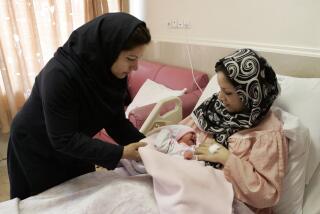World Survey Finds Gaps in Family Planning
- Share via
WASHINGTON — Despite two decades of efforts to bring family planning to the Third World, there are serious shortages in services available in 82 developing nations, according to a 110-nation study made public Sunday by the Population Crisis Committee.
Declines in family size correspond closely with the quality of available services, the committee said in a summary of its study, which will be published in full next month under the title “Access to Birth Control: A World Assessment.”
The survey found conditions ranging from “poor” to “very poor” in 36 African nations--every African state except little Mauritius. J. Joseph Speidel, the committee’s vice president, predicted that the African states will double their populations in the next 18 to 38 years unless current growth rates are reduced.
Zero Ratings to Some
In the same bottom categories were 12 nations in the Middle East, seven in Asia and eight in Latin America. The committee gave zero ratings to Laos, Libya and Cambodia, all three of which it said have “virtually no family planning services.”
By contrast, the committee gave “excellent” ratings to family planning programs and performance in China, Taiwan, Singapore, Hong Kong and South Korea, all five of which have recorded substantial declines in total fertility rates, along with virtually unrestricted access to birth control procedures and devices. China’s government has instituted rigorous policies to rein in its population, which now exceeds 1 billion.
The study ranked the United States seventh among developed nations in the availability of modern birth control methods. It said the United Kingdom has “the best family planning services in the world” and gave it a score of 29 out of a possible 30 points. It ranked the programs of West Germany, Australia, Canada, France and Italy slightly ahead of this country’s, which it scored at 25.
Speidel estimated that family planning services cost an average of $20 per year per couple but said “the world needs to spend an additional $5 billion per year” to reach all the poor women who “need and want family planning right now.”
U.S. Aid Reductions
Without counting China, which is so huge that its totals skew any statistics in which they are included, the report said that Third World governments spend about $1.5 billion annually on family planning programs. Of this, about $500 million is contributed by industrialized nations, about half from the United States. It estimated that China spends about $1 billion of its own funds on its programs.
The report was critical of reductions in U.S. contributions under the Reagan Administration, noting that the U.S. share has fallen from $288 million in 1985 to $225 million in the current 1987 fiscal year. The Administration has requested $226 million for such programs in 1988, and expectations are that this will be close to the final figure after Congress completes action on the budget.
“The U.S. has abdicated world leadership in birth control technology and family planning aid,” said Dr. Sharon L. Camp, editor of the forthcoming assessment. “The world needs to more than double spending on family planning, yet U.S. technical and financial aid for international family planning has declined by 20% since 1985 and is in danger of eroding further.”
Domestically, the report said, “the United States is no longer a leader in contraceptive choices available to couples.” It ranked the world’s 15 most populous industrialized nations for availability of birth control pills, intrauterine devices (IUDs), male and female sterilization, safe abortion, other methods (including condoms), contraceptive services for the poor and for minors, sex education and information programs.
The report noted that product liability lawsuits have led manufacturers to withdraw two leading IUDs from the market and suggested that the suits have discouraged contraceptive research while some new contraceptives have been approved for sale overseas but not in this country.
The paper held that U.S. family planning activities retard dissemination of birth control information, observing: “Contraceptive advertising in the U.S. is still considered inappropriate on television and radio, and conservative attitudes inhibit sex education and the provision of services to minors.”
It was because six other industrial nations were doing more in these areas that they were scored ahead of the United States in the overall ranking, the report said. Listed thirteenth in the ranking, with 19 points, was Japan, where the report said 82% of couples use condoms because of restrictions on the pill and IUD.
The report gave only 11 points to the Soviet Union, where it said “abortion is the leading birth control method because other options are severely limited.”
More to Read
Sign up for Essential California
The most important California stories and recommendations in your inbox every morning.
You may occasionally receive promotional content from the Los Angeles Times.










